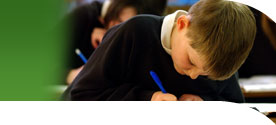



The key concepts for Modern foreign languages provide a context for developing pupils' personal, learning and thinking skills (PLTS).
This focuses on developing the language skills pupils need to communicate effectively with different audiences and for different purposes, both within the classroom and beyond. It requires reflective learners who constantly monitor their success in understanding and communicating with others. They become self-managers who are able to review their progress in the target language and identify what they need to improve. The process of self and peer assessment involves them collaborating with others as team workers.
This emphasises the need for pupils to use their imagination to communicate a wide range of ideas and opinions using their existing range of language. It requires creative thinkers who can explore possibilities of adapting and re-using language in new contexts and who can try out alternatives or find new solutions.
This involves learning about different countries, cultures and perspectives. It requires independent enquirers who recognise that people in other countries may have different beliefs and attitudes and see the world in a different way. Pupils are encouraged to compare their own experiences and perspectives with those of people in other countries and communities. They may then act as effective participators by explaining or representing views that may differ from their own.
With thoughtful planning, a range of PLTS can be embedded in any sequence of work. For example, pupils might be asked to prepare a group presentation, in the target language, on an aspect of life in another country over several lessons. This would involve pupils: